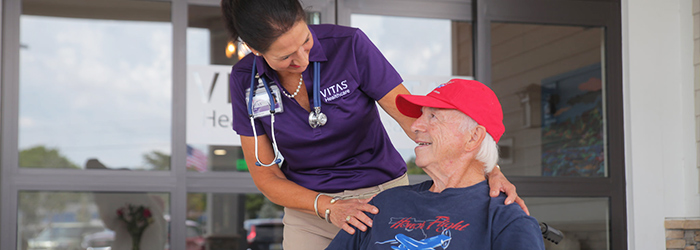How to Help your Seriously Ill Veteran Patient

Become Aware of Your Patient’s Background
How many healthcare professionals caring for patients with serious progressive illness are even aware of their patient’s military background? How many doctors would know, when symptoms increase and treatments are no longer effective, that uncontrolled pain and anger, or nightmares, may be delayed or undiagnosed post-traumatic stress disorder (PTSD)?
Not enough. Considering that, according to the VA, half of the men who die today are military veterans*, and that 85 percent of veterans receiving end-of-life care are outside the VA system, there are a lot of veterans who would benefit from hospice services that are designed to meet the unique needs of veterans.
Hospice Treats Veterans’ Unique Needs
Hospice professionals are trained to understand veterans’ unique needs at the end of life and guide these men and women toward a more peaceful death. This is especially important for veterans who experienced combat service or other trauma, because experiences from the past often resurface near the end of life.
In recognition of this, the National Hospice and Palliative Care Organization (NHPCO) and the Department of Veterans Affairs (VA) have initiated a pioneer project: “We Honor Veterans” focuses on respectful inquiry, compassionate listening and grateful acknowledgment of veterans. VITAS is a partner in “We Honor Veterans” and we are recognized for our dedication to veterans.
Physical and Emotional Effects of Military Service
The toll of war can include diseases, disabilities and illnesses that complicate end-of-life care. Depending on the war, veterans may have been exposed to ionizing radiation, Agent Orange, open-air burn pits, battlefield transfusions, below-freezing temperatures and infectious diseases.
These exposures put them at a higher risk for a variety of cancers, type 2 diabetes, kidney disease, heart disease, hepatitis C, respiratory illnesses, malaria, TB and more. Veterans can also suffer from co-morbidities such as PTSD, depression, alcoholism, drug addiction and mental illness.
In addition to physical and psychological conditions, emotional concerns may arise, such as feeling the need to purge themselves of memories by discussing their military experience with family members, sometimes for the first time. Veterans also have concerns about their families and how they will manage after the veteran dies.
Here’s What a Hospice Provider Should Offer to Veterans
- A streamlined referral and admission process
- Familiarity with the VA system and how to identify and access benefit options for veterans
- Coverage of hospice care for veterans by the VA, TRICARE, Medicare, Medicaid, private insurance and other forms of reimbursement
- Coordination of care with the staff of the local VA medical center, including joint visits when appropriate
- Staff trained to function as communications contacts and primary educational resources to the VA and local veteran organizations
- Referrals for additional community services as needed
- Bereavement support, including grief and loss programs, support groups and memorial services, for veterans’ loved ones
- Recognition and celebration of important events such as Veteran’s Day and military anniversaries
If you have a seriously ill patient who is a military veteran, talk to the patient and family about whether they are using or have questions about their VA benefits. Then get a hospice provider involved that can help the family navigate the VA system, and help your patient feel respected and listened to as he or she approaches the end of life.
*http://www.npr.org/2015/01/28/382218316/end-of-life-care-can-be-different-for-veterans

Check Hospice Guidelines
Get diagnosis-specific guidelines in our hospice eligibility reference guide.
Hospice Guidelines by Diagnosis Refer Your Patient